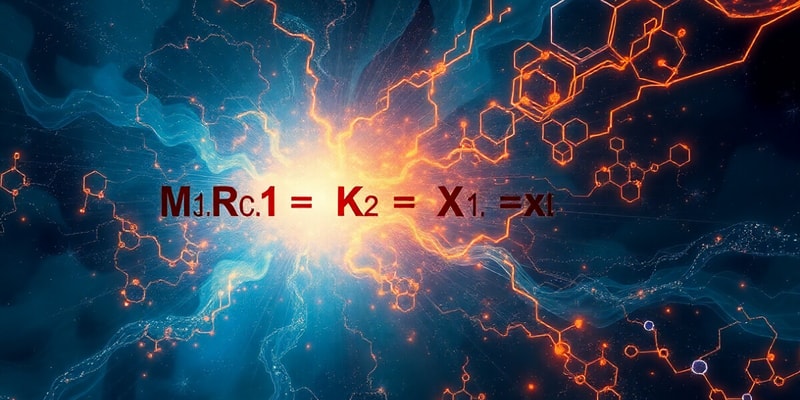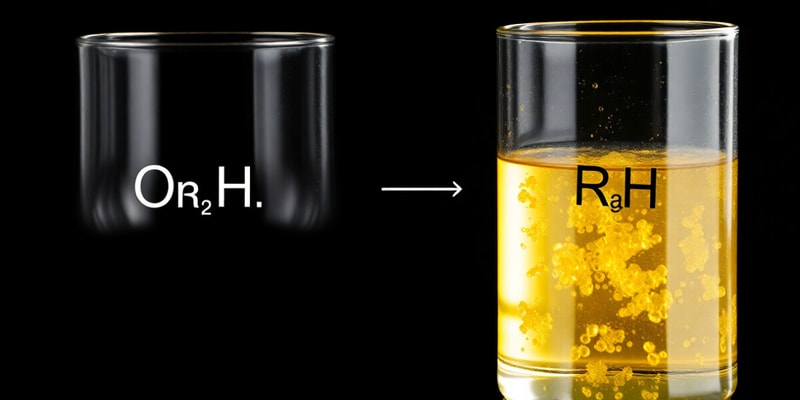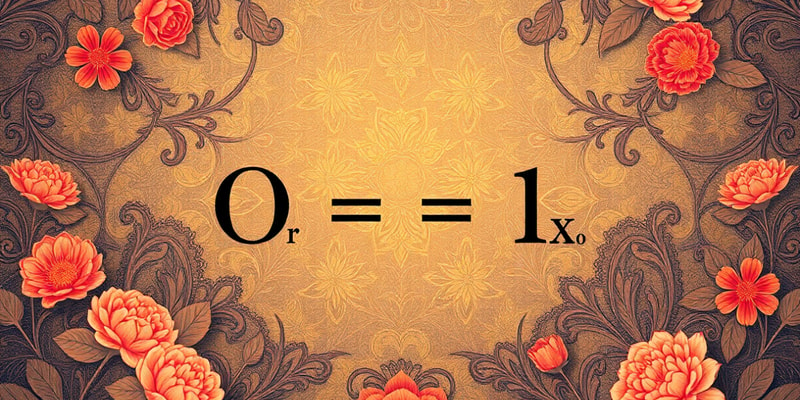Podcast
Questions and Answers
The final equation shows that 2MnO4- reacts with 3CN- to produce 2MnO2 and 3OCN-.
The final equation shows that 2MnO4- reacts with 3CN- to produce 2MnO2 and 3OCN-.
True
The charge balance for the final equation is -4 on each side.
The charge balance for the final equation is -4 on each side.
False
H2O is added to both sides to balance the number of hydrogen atoms in the equation.
H2O is added to both sides to balance the number of hydrogen atoms in the equation.
True
For every H+ added, an equal number of OH- ions must be added to the same side of the equation.
For every H+ added, an equal number of OH- ions must be added to the same side of the equation.
Signup and view all the answers
In the reduction half-reaction, 4H+ and 4OH- are added to maintain the balance.
In the reduction half-reaction, 4H+ and 4OH- are added to maintain the balance.
Signup and view all the answers
The oxidation half-reaction involves the conversion of CN- to OCN- with the loss of electrons.
The oxidation half-reaction involves the conversion of CN- to OCN- with the loss of electrons.
Signup and view all the answers
After the reactions, 8OH- ions are produced in the final equation.
After the reactions, 8OH- ions are produced in the final equation.
Signup and view all the answers
The balancing process shows that there are 5 oxygen atoms on each side of the final equation.
The balancing process shows that there are 5 oxygen atoms on each side of the final equation.
Signup and view all the answers
Removing electrons from the equation helps in achieving charge balance in redox reactions.
Removing electrons from the equation helps in achieving charge balance in redox reactions.
Signup and view all the answers
The final balanced equation includes two different species of manganese.
The final balanced equation includes two different species of manganese.
Signup and view all the answers
The oxidation state of sulfur in SO32- is higher than in SO42- after balancing the redox reaction.
The oxidation state of sulfur in SO32- is higher than in SO42- after balancing the redox reaction.
Signup and view all the answers
In the redox reaction, the reduction of MnO4- requires the addition of 5 electrons.
In the redox reaction, the reduction of MnO4- requires the addition of 5 electrons.
Signup and view all the answers
During the balancing of redox reactions, oxygen is balanced using H2O molecules.
During the balancing of redox reactions, oxygen is balanced using H2O molecules.
Signup and view all the answers
The final balanced equation for the reaction involving SO32- and MnO4- produces 5 moles of OCN-.
The final balanced equation for the reaction involving SO32- and MnO4- produces 5 moles of OCN-.
Signup and view all the answers
In the oxidation half-reaction, SO32- is converted to SO42- and loses 2 electrons.
In the oxidation half-reaction, SO32- is converted to SO42- and loses 2 electrons.
Signup and view all the answers
The charge balance for the final equation is equal to -8 on both sides of the equation.
The charge balance for the final equation is equal to -8 on both sides of the equation.
Signup and view all the answers
In the example involving cyanate, MnO4- is reduced to MnO2.
In the example involving cyanate, MnO4- is reduced to MnO2.
Signup and view all the answers
The balancing of hydrogen atoms in the reaction requires the addition of H+ ions.
The balancing of hydrogen atoms in the reaction requires the addition of H+ ions.
Signup and view all the answers
The total number of moles of SO42- produced in the final reaction is 6.
The total number of moles of SO42- produced in the final reaction is 6.
Signup and view all the answers
In a redox reaction, balancing the number of electrons lost and gained is not necessary.
In a redox reaction, balancing the number of electrons lost and gained is not necessary.
Signup and view all the answers
Study Notes
Balancing Redox Reactions: Example 1
-
Sulfite (SO32-) is oxidized to sulfate (SO42-)
-
Permanganate (MnO4-) is reduced to manganese (II) ion (Mn2+)
-
The reaction takes place in an acidic solution
-
The half-reactions are balanced as follows:
- Oxidation: SO32- + H2O -> SO42- + 2H+ + 2e-
- Reduction: MnO4- + 8H+ + 5e- -> Mn2+ + 4H2O
-
The electrons are canceled out by multiplying the oxidation half-reaction by 5 and the reduction half-reaction by 2
-
The final balanced equation is: 5SO32- + 2MnO4- + 6H+ -> 5SO42- + 2Mn2+ + 3H2O
Balancing Redox Reactions: Example 2
-
Cyanide (CN-) is oxidized to cyanate (OCN-)
-
Permanganate (MnO4-) is reduced to manganese dioxide (MnO2)
-
The reaction is carried out in an aqueous basic solution
-
The half-reactions are balanced as follows:
- Oxidation: CN- + 2OH- -> OCN- + H2O + 2e-
- Reduction: MnO4- + 2H2O +3e- -> MnO2 + 4OH-
-
The electrons are canceled out by multiplying the oxidation half-reaction by 3 and the reduction half-reaction by 2
-
The final balanced equation is: 2MnO4- + 3CN- + H2O -> 2MnO2 + 3OCN- + 2OH-
Studying That Suits You
Use AI to generate personalized quizzes and flashcards to suit your learning preferences.
Related Documents
Description
Test your knowledge on balancing redox reactions with these examples. This quiz covers the oxidation of sulfite to sulfate and cyanide to cyanate, along with the reduction of permanganate. Perfect for chemistry students aiming to master redox equations in acidic solutions.




